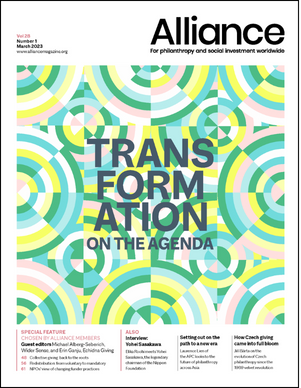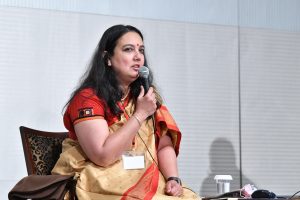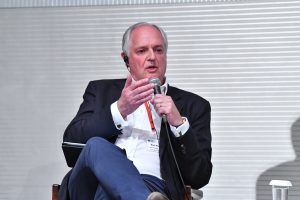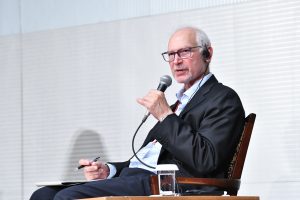A key theme of the first Asia Philanthropy Congress was the role the private sector can play in creating sustainable and inclusive societies
‘We (in Asia) need to triple our efforts. We don’t have much time left. It’s really important that we all agree that we need to go fast and go together,’ stressed AVPN chief executive Naina Batra at the first Asia Philanthropy Congress, held in Tokyo last November. Organised by the Nippon Foundation, this one-day event brought together foundation representatives, philanthropists, business and NGO leaders from across the region.
The congress’ stated purpose was to ‘build a platform that will seek solutions to social problems through cross-sectoral collaboration’. As diverse as the grouping was, there was no disagreement on this basic principle or that Asia is important for global well-being. Still, the question remains, how can Asian societies pursue cross-sector collaboration?
One underlying theme of the congress, and the back-to-back Social Investment Forum organised by AVPN, was how to maximise the potential of business as a force for good?
One way might be ‘stakeholder capitalism’, defined by Klaus Schwab in his book of the same title as ‘a form of capitalism in which companies not only optimise short-term profits for shareholders, but seek long-term value creation by taking into account the needs of all their stakeholders, and society at large’. This mindset shift is gaining momentum across the region: corporate social responsibility (CSR) has become mandatory in India and Indonesia. In Japan, SDG and ESG are not only spelled out on every large company’s website, but also on commuter trains and buses – and even the rainbow pin on the suit of a department store employee. China is among the leading advocates of the B Corp movement. As former CEO of Unilever Paul Polman explained, putting sustainability before profit-making is no longer a choice: ‘You can’t create business on a death planet. The cost of not acting is becoming higher than the cost of acting,’ he said. Sustainability has also become a motivating factor for employees, especially the younger generation. Jamshyd Godrej, chairman and managing director of Godrej & Boyce Manufacturing, said that employees have been an important part of the journey to create India’s first rated net zero energy building.
Regardless of the goodwill, a fundamental shift away from maximising profits to a stakeholder economy that prioritises sustainability and inclusiveness requires more than cherry-picking a few goals on the SDG chart. Businesses in Asia need to redesign their strategy to create long-term shared value. As many congress speakers stressed, forming good partnerships with other sectors is essential to establishing trust.
Seeking role models for a philanthropy-business partnership
While a ‘win-win relationship’ between business and philanthropy remains a work in progress, several different scales of successful initiatives were showcased at the congress. The Valuable 500 is the largest global network of CEOs committed to disability inclusion, comprising 415 companies from 35 countries. In 2021, the Nippon Foundation joined the initiative as a global impact partner with a $5 million investment and bringing more than 50 years of experience of supporting people with disabilities in Japan and around the world. Caroline Casey, founder of The Valuable 500, acknowledged that support from the Nippon Foundation brings credit from the business world. ‘We founded Valuable 500 because the scale of exclusion is massive,’ she said. ‘Our aim is system change to remove the barrier, not band-aid philanthropy.’
New trends blur boundaries
The conversation at both the Asia Philanthropy Congress and AVPN Forum reflected a larger trend within philanthropy that looks beyond sector borders to find innovative solutions to some of society’s most intractable challenges. More foundations and philanthropists in Asia are talking about giving and grantmaking as ‘social investing’. Impact investment, too, is making headway. Japan’s impact investing has grown from 71.8 billion JPY ($475 million) in 2018 to 1,320.4 billion JPY ($8.7 billion) in 2021. Both Korea and Japan have successfully launched social impact bond (SIB) initiatives in recent years for improving physical and mental health, young adult employment and foster parenting. Although still at an experimental stage, these efforts demonstrate the power of multi-stakeholder engagement through a partnership of the private sector, investors, the government and non-profit organisations.
A fundamental shift away from maximising profits to a stakeholder economy that prioritises sustainability and inclusiveness requires more than cherry-picking a few goals on the SDG chart.
Give young generation the stage
This tendency to blur boundaries is likely to continue and expand, in part because millennials are embracing it. Younger generations in Asia approach societal problems differently than older generations. For them, business is a tool to make the world a better place. They agree that a healthy society needs to be more diverse and inclusive. Adelle Odelia Tanuri is head of investments at Indonesia’s YCAB Venture, a for-profit entity that provides financial inclusion services for micro-entrepreneurial mothers and invests in impactful and scalable social enterprises. As the only young participant at the congress’ high-level roundtable session, she urged senior leaders: ‘Young people are the ones who are good with technology. They have different ways of doing things and a voice we need to hear.’
An estimated 35 per cent of Asia’s wealth is likely to be in millennial hands in the next five to seven years. For the new and next-generation philanthropists who grew up in a world where mission and money-making can coexist, giving money is not good enough. Asian philanthropy is undergoing a profound cultural change triggered by generational differences.
Fan Li is East Asia Regional Representative for Alliance & WINGS.
Email: fanli73@gmail.com










Comments (0)
The topic is really engaging to experience diverse issues. Explore space and do more in-depth research in the field.